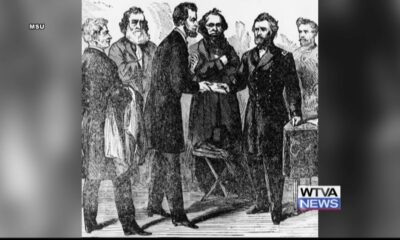Mississippi News
How Black senators controlled the narrative on a historic day at the Capitol
How Black senators controlled the narrative on a historic day at the Capitol
Note: This analysis first published in Mississippi Today’s weekly legislative newsletter. Subscribe to our free newsletter for exclusive early access to weekly analyses.
Sen. Derrick Simmons sensed his Black colleagues were growing more and more frustrated.
During Jan. 21 debate of a bill that seeks to ban the teaching of critical race theory, white senators were arguing that the existence of systemic racism was “a subjective myth.” They argued that Mississippi children should not be taught about how racism permeates society, that the teaching of racism was similar to the teachings of Karl Marx.
The personal, emotional pleas of Black senators during the debate were being ignored by their powerful white colleagues.
So Simmons, a Black man from the Mississippi Delta who serves as the Senate Democratic leader, hatched an idea. One by one, he approached the desks of his 13 Black colleagues and got their approval.
When the vote for final passage was called, Simmons stood up and requested a roll call vote. That meant instead of a typical voice vote, each senator would be called upon individually to vote yea or nay.
As the Senate clerk began calling the roll, all 14 Black senators stood up and walked off the floor. The decision by Black senators — all Democrats — to walk out ultimately meant nothing for the final outcome since Republicans alone have enough members to pass any bill they want. But the symbolism of their decision ran deep.
In the state with the most sordid and violent history of racism, Black lawmakers employed a principal strategy of the civil rights movement — organizing a walkout — to protest passage of a bill that threatened the teaching of that very history.
It was an unprecedented moment in Mississippi history. In 1993, Black caucus members left before then-Gov. Kirk Fordice delivered his State of the State speech in protest of his policies. But no Capitol observer can recall an instance of members walking out in protest before a vote on a bill.
“The greatness of America is the right to protest for what you think is right,” Simmons told Mississippi Today. “Together we believed that this was the right thing to do, to walk out. So that’s what we did. We decided that nonsense wasn’t worth our votes.”
READ MORE: Every Black Mississippi senator walked out as white colleagues voted to ban critical race theory

One great irony: It could’ve been a historic day for such different reasons.
A few minutes after the critical race theory bill passed, the Senate passed what would be the largest pay raise for public school teachers in decades — a critical moment for the nation’s lowest-paid educators.
The teacher pay plan was Republican Lt. Gov. Delbert Hosemann’s top legislative priority in 2022, one he and his staff had worked on for months. Hosemann, who did not preside over the debate of either bill on Friday, sent a press release following the eventful day touting passage of that bill.
But Hosemann garnered few accolades about his teacher pay plan on Friday because the Black senators had complete control of the narrative of the day.
They owned the headlines across Mississippi, and television stations across the state led with B-roll of their walkout on primetime news. The walkout went national and international. Simmons appeared Saturday on MSNBC to discuss the implications of the bill and the historic decision by Black lawmakers to skip the vote.
“The people who threw rocks at Ruby Bridges for trying to go to school are now upset that their grandchildren might learn that they threw rocks at Ruby Bridges for trying to go to school,” Simmons said. “To improve Mississippi and America, the truth must be told. White children, Black children, my children, your children should hear the history of slavery, the civil rights movement, the uncontrolled killing of Black Americans. They should hear that history and decide they want to make Mississippi a better place together.”
Simmons continued: “Racism is part of our history. We have to acknowledge it exists, and we have to talk about it.”

Several Black senators went to the well before the final vote, laying out clearly where they stood on the bill and what they thought of its passing.
“There are 14 Black senators in this chamber, and these 14 are telling you that this bill is morally wrong,” said Sen. Barbara Blackmon, D-Canton. “Yet you ignore the thoughts, positions of these 14 members of this body. So it must be something if all 14 of us feel or think that something is wrong with this bill.”
Perhaps the most powerful plea made from the floor was from Sen. David Jordan, a freedom fighter during the movement. The 88-year-old Jordan taught for 33 years in Mississippi public schools — and 20 of them in integrated public schools.
As Jordan put it, many white Mississippians didn’t want him teaching their children. But he taught them the way he’d taught all his students: by providing facts, science and truth.
“It’s sad we’ve wasted so much time on something that’s not necessary,” Jordan said from the floor before the vote. “Mississippi has come a long way together. If anybody has suffered from racism, it’s people of color. We feel that we don’t need this bill. We are satisfied without it; what do you need it for? We have been the victims of it (racism). We cannot continue, Christian friends, stumbling into the future backwards. That’s what this bill does for us. We have more important things to do. We need to show more cohesiveness and progress.”
State of play and what to watch for:
1) The consideration of critical race theory legislation stands to jeopardize relationships between white and Black legislative leaders.
In the Blackest state in America, where a major constituency is often ignored or left behind by policy passed in Jackson, these relationships are a very big deal. Black leaders have continued to project good will toward white leaders following the June 2020 state flag change. After decades of effort from Black lawmakers, white leaders finally chose to work with their Black colleagues to change the flag, the last in the nation featuring the Confederate battle emblem.
“You couldn’t help but to feel good after what we did together in June 2020,” Simmons said. “You had this mindset as a Mississippian that we can move forward in a spirit of being inclusive, not exclusive. And then here we are less than two years later, we allow what goes on in the nation (critical race theory debate) to come into the state to divide us. We had so much hope and optimism after the flag. But on Friday, you almost feel completely deflated.”
2) What will the House do?
The Senate critical race theory bill was relatively mild compared to legislation proposed in other states. And the House is led by Speaker Philip Gunn, who has made his intention to address critical race theory very well known. Will the House bill be more restrictive in terms of what Mississippi teachers can or can’t teach? Having seen the broad public outcry from the Senate vote, will House leaders accept the Senate version and move on to other issues?
Black caucus members in the House have a big head start now to prepare for how they’ll respond to whatever happens. The debate will almost certainly be more dramatic in the House, where pretty much everything is more dramatic.
3) Is this all worth it?
This push to ban critical race theory is rooted in national political rhetoric — a red meat issue pushed by out-of-state interest groups. Republican Sen. Mike McLendon, the bill’s author who defended it on the floor last week, said himself that his constituents pushed the issue based on what they saw on Fox News. McLendon nor any other politician can point to a single instance of critical race theory being taught in the state — a fact confirmed by state education officials.
White Republicans are pushing this bill knowing definitively that it will hurt their relationships with Black colleagues and their Black constituents. That harm cuts deep, and it will linger for a long time. In November 2023, when those Republican lawmakers are running for reelection, will their constituents remember or even care about this hot-button issue that’s gotten play on Fox News in recent weeks?
4) Mississippi teachers are, once again, caught in the middle of a major political fight at the Capitol.
Another great irony of all this is white legislative leaders are simultaneously pushing massive pay raise proposals for teachers while effectively telling them what they can and cannot teach. That reality could stand to further sow distrust of lawmakers among educators, who already deeply distrust lawmakers.
There are more than 30,000 educators (plus their families and loved ones) in Mississippi. That’s a major voting bloc that could remember all this when legislative and statewide elections come up in 2023.
This article first appeared on Mississippi Today and is republished here under a Creative Commons license.
Mississippi News
Attorneys file motion to delay Jackson bribery trial
SUMMARY: In connection with the Jackson bribery scandal, attorneys for federal officials and local leaders filed a motion to postpone the trial to allow time for extensive evidence review, including hours of recordings and thousands of pages of documents. Key figures charged include Hinds County DA Jody Owens, Jackson Mayor Chokwe A. Lumumba, and Councilman Aaron Banks, each facing multiple counts of conspiracy related to bribery and fraud. The scandal involves alleged bribes amounting to over $80,000 related to a downtown development project, facilitated by individuals posing as real estate developers working with the FBI.
The post Attorneys file motion to delay Jackson bribery trial appeared first on www.wjtv.com
Mississippi News
Family of Dexter Wade rallies outside JPD nearly two years after his death
SUMMARY: Nearly two years after Dexter Wade’s death, his family continues seeking justice. On November 20, Dexter Wade Day was observed in Jackson, declared by Councilman Kenneth Stokes. Wade, hit by a Jackson police cruiser in March 2023, was later found in a pauper’s grave in Hinds County, and his mother, Bettersten Wade, was unaware of his death until August 2023. She believes his death was covered up. No arrests have been made, and authorities consider it an accident. Jackson Police Chief Joseph Wade expressed condolences and shared updates on new policies to prevent similar tragedies.
The post Family of Dexter Wade rallies outside JPD nearly two years after his death appeared first on www.wjtv.com
Mississippi News
Man shot while helping with stalled vehicle in Jackson
SUMMARY: A man was shot in Jackson, Mississippi, while attempting to assist a person with a stalled vehicle on State Street at Beasley Road around 4:00 p.m. on November 20. Detective Tommie Brown reported that the victim was working on the vehicle when the suspect approached, questioned him, and then opened fire. The assailant fled the scene in a vehicle. Fortunately, the victim sustained non-life-threatening injuries and was taken to a local hospital. The Jackson Police Department is seeking information about the incident and encourages anyone with details to contact them or Crime Stoppers.
The post Man shot while helping with stalled vehicle in Jackson appeared first on www.wjtv.com
-

 Our Mississippi Home7 days ago
Our Mississippi Home7 days agoCreate Art from Molten Metal: Southern Miss Sculpture to Host Annual Interactive Iron Pour
-

 Local News6 days ago
Local News6 days agoCelebrate the holidays in Ocean Springs with free, festive activities for the family
-

 News from the South - Georgia News Feed6 days ago
News from the South - Georgia News Feed6 days ago'Hunting for females' | First day of trial in Laken Riley murder reveals evidence not seen yet
-

 News from the South - Alabama News Feed6 days ago
News from the South - Alabama News Feed6 days agoFirst woman installed as commanding officer of NAS Pensacola
-

 Kaiser Health News3 days ago
Kaiser Health News3 days agoA Closely Watched Trial Over Idaho’s Near-Total Abortion Ban Continues Tuesday
-

 Mississippi Today6 days ago
Mississippi Today6 days agoOn this day in 1972
-

 News from the South - Alabama News Feed2 days ago
News from the South - Alabama News Feed2 days agoTrial underway for Sheila Agee, the mother accused in deadly Home Depot shooting
-

 News from the South - Alabama News Feed2 days ago
News from the South - Alabama News Feed2 days agoAlabama's weather forecast is getting colder, and a widespread frost and freeze is likely by the …































